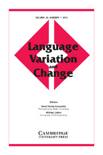
Language Variation and Change
Scope & Guideline
Unraveling the Threads of Language Evolution
Introduction
Aims and Scopes
- Sociolinguistic Variation:
The journal emphasizes the study of language variation as influenced by social factors, including class, ethnicity, and gender. This includes examining how these social dimensions impact language use and change. - Language Change Dynamics:
A significant focus is on the mechanisms of language change, exploring how and why languages evolve over time, including phonetic, morphological, and syntactic changes. - Dialectology and Regional Variation:
The journal covers research on regional dialects and their characteristics, contributing to the understanding of how geography interacts with language use. - Quantitative and Qualitative Analysis:
Methodologically, the journal employs both quantitative and qualitative approaches to analyze language data, providing a comprehensive view of linguistic phenomena. - Interaction of Language and Identity:
Research often explores how language variation relates to identity construction, including aspects of social distinction and group affiliation.
Trending and Emerging
- Digital Linguistics:
There is a notable trend towards exploring language variation in digital contexts, such as social media, where new forms of language use and variation are emerging. - Gender and Language Studies:
Research focusing on the intersection of gender and language is gaining prominence, highlighting how gender identity influences language use and variation. - Cognitive and Psychological Factors:
An emerging theme involves examining the cognitive aspects of language variation, including how psychological factors influence language processing and use. - Community and Identity Dynamics:
There is an increasing focus on how language variation reflects and constructs community identities, particularly in multicultural and multilingual contexts. - Phonetic and Phonological Variation:
Recent papers are increasingly investigating phonetic changes and their social implications, reflecting a growing interest in the detailed mechanisms of speech variation.
Declining or Waning
- Historical Linguistics Focus:
There appears to be a decline in the number of papers centered on historical linguistics, particularly those that focus solely on diachronic aspects without a sociolinguistic lens. - Static Descriptive Studies:
Research that primarily aims to provide static descriptions of dialects or languages, without engaging with the dynamics of change or social implications, seems to be less frequent. - Language Universals and Typology:
Papers focusing on universal features of language or typological comparisons are appearing less frequently, possibly indicating a shift towards more context-specific studies.
Similar Journals

RLA-Revista de Linguistica Teorica y Aplicada
Unveiling new perspectives in theoretical and applied linguistics.RLA-Revista de Linguística Teórica y Aplicada, published by Universidad de Concepción, Facultad de Humanidades y Arte, stands as a vital resource in the field of linguistics, delivering cutting-edge research and scholarly articles that contribute to both theoretical and applied linguistics. With its ISSN 0718-4883, this journal aims to foster robust discussions and innovations in linguistic theory, language acquisition, sociolinguistics, and applied linguistics methodologies. Although the journal currently does not provide open access options, it endeavors to reach a diverse audience, including researchers, professionals, and students, who are keen to explore the rich tapestry of language studies. By offering insights from both local and global perspectives, RLA does not only advance linguistic discourse but also encourages interdisciplinary collaboration, thereby solidifying its role as a pivotal publication in the linguistic academic community.

Glossa-A Journal of General Linguistics
Exploring the Frontiers of Linguistic KnowledgeGlossa: A Journal of General Linguistics, published by the Open Library of Humanities, stands as a leading voice in the realm of linguistic research since its inception in 2016. With its Q1 category ranking in Linguistics and Language and impressive Scopus ranks encompassing the top 83rd and 81st percentiles in its respective fields, Glossa fosters a vibrant academic community committed to the rigorous exploration of language and linguistic theory. Operating under an open access model, the journal not only enhances the visibility of groundbreaking research but also ensures that valuable insights are accessible to a global audience. The journal's commitment to interdisciplinary dialogue makes it an indispensable resource for scholars, professionals, and students eager to engage with contemporary developments in linguistics. As it converges into 2024, Glossa continues to champion innovative scholarship and critical discourse that challenges conventional boundaries within the field.

REVUE DE LINGUISTIQUE ROMANE
Advancing Knowledge in Linguistic HeritageREVUE DE LINGUISTIQUE ROMANE, published by the esteemed SOCIÉTÉ LINGUISTIQUE ROMANE, is a prominent academic journal dedicated to the exploration of Romance linguistics. With its ISSN 0035-1458, the journal plays a significant role in advancing knowledge within the fields of linguistics and the history and philosophy of science. Although it does not currently offer Open Access, it provides critical insights and peer-reviewed research that are indispensable for scholars, educators, and students interested in the nuances of Romance languages. The journal, which has seen converged coverage from 2006 to 2017, and then again from 2019 to 2021, is ranked in the third quartile (Q3) across various categories within Scopus, reflecting its established presence in the academic community. As a vital resource for interdisciplinary studies, REVUE DE LINGUISTIQUE ROMANE is instrumental for those seeking to deepen their understanding of linguistic structures, cultural nuances, and the historical development of Romance languages.

Euskera
Celebrating the Rich Heritage of the Basque LanguageEuskera is a distinguished academic journal dedicated to the study and promotion of the Basque language and culture, published by EUSKALTZAINDIA, the Royal Academy of the Basque Language. With the ISSN 0210-1564, this journal serves as a pivotal platform for researchers, linguists, and cultural scholars to disseminate cutting-edge research and discussions focused on linguistics, language preservation, and Basque identity. Although the journal is not classified as Open Access, it provides comprehensive insights into the advancement of Basque studies and contributes significantly to the field’s academic discourse. Aimed at fostering a deeper understanding and appreciation of the linguistic and cultural heritage of the Basque people, Euskera plays an invaluable role in connecting scholars and practitioners, promoting vibrant scholarly exchanges that enrich both local and global perspectives.
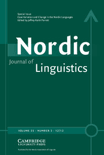
Nordic Journal of Linguistics
Elevating academic standards in language research.Nordic Journal of Linguistics, published by Cambridge University Press, serves as a prominent platform for the dissemination of cutting-edge research in the field of linguistics. Established in 1978 and spanning over four decades, the journal has curated a rich repository of scholarly work that reflects the dynamic and evolving nature of language studies. With an impressive Q2 ranking in both the Linguistics and Language category and a commendable performance in Scopus rankings, placing it at the 74th percentile among Arts and Humanities, the journal is recognized for its high academic standards and impact on contemporary linguistic research. Scholars and practitioners can access a variety of studies that delve into different languages, linguistic theories, and methodologies, fostering broader understanding and dialogue within the linguistic community. Although the journal does not currently offer open-access options, it remains an invaluable resource for researchers, professionals, and students keen on advancing their knowledge of language and linguistics.
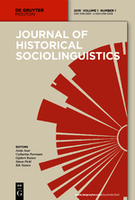
Journal of Historical Sociolinguistics
Advancing Understanding of Sociolinguistic Dynamics Across ErasThe Journal of Historical Sociolinguistics is a distinguished publication focusing on the intricate relationships between language and society from a historical perspective. Published by WALTER DE GRUYTER GMBH in Germany, this journal (ISSN: 2199-2894, E-ISSN: 2199-2908) is recognized for its rigorous scholarship, ranking in the Q2 quartile in Linguistics and Language (2023), highlighting its relevance and impact within the academic community. With Scopus rankings placing it at #326/1088 in Arts and Humanities and #386/1167 in Social Sciences, this journal is essential for researchers and scholars interested in the dynamics of language evolution, sociolinguistic shifts, and historical context. Through its insightful articles and contributions, the journal aims to illuminate the nuanced interplay between linguistic change and social factors over time, making it an invaluable resource for students, professionals, and academics alike. The journal operates under an open-access model, ensuring that knowledge is disseminated widely and freely accessible to those engaged in the cutting-edge studies of sociolinguistics.

Verba-Anuario Galego de Filoloxia
Illuminating the Depths of Galician LinguisticsVerba-Anuario Galego de Filoloxia is a prominent academic journal published by UNIV SANTIAGO COMPOSTELA, dedicated to advancing the field of linguistics and language studies. Hailing from Spain, this journal provides a vital platform for researchers, educators, and students interested in Galician philology and its broader linguistic implications. Although it operates under traditional access models, the journal’s commitment to quality research is reflected in its categorization within Q3 in Linguistics and Language for 2023, showcasing its significant contributions to the field. Encompassing a convergence period from 2017 to 2024, Verba garners attention in both the Arts and Humanities and Social Sciences domains, with its Scopus rankings highlighting its moderate impact within these categories. By nurturing scholarly dialogue and disseminating innovative studies, Verba-Anuario Galego de Filoloxia plays a crucial role in promoting linguistic research, making it an essential resource for professionals and academic institutions striving to explore the complexities of language and philology.
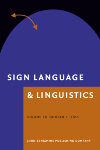
Sign Language & Linguistics
Celebrating Two Decades of Linguistic ExcellenceSign Language & Linguistics is an esteemed academic journal published by John Benjamins Publishing Co, dedicated to advancing the field of sign language studies and linguistics. With an ISSN of 1387-9316 and an E-ISSN of 1569-996X, this journal has earned a prominent place in the linguistic community, achieving a Q1 ranking in both the Linguistics and Language category, and standing out within the Scopus rankings, placing in the 77th percentile among the Arts and Humanities and 75th percentile in the Social Sciences categories. Sign Language & Linguistics spans over two decades of research, offering comprehensive insights and analyses from 1998 to 2024, promoting high-quality scholarly communication. Aimed at researchers, professionals, and students alike, this journal is essential for those exploring the intersection of sign languages, linguistics, and cultural studies, facilitating progressive discourse and fostering an understanding of this vital mode of human communication.

Concentric-Studies in Linguistics
Connecting scholars through groundbreaking linguistic studies.Concentric-Studies in Linguistics is a distinguished journal published by the National Taiwan Normal University, College of International Studies & Social Sciences. With an ISSN of 1810-7478 and an E-ISSN of 2589-5230, this journal contributes significantly to the field of linguistics, encompassing a wide range of topics from language acquisition to sociolinguistics. As of 2023, it holds a respectable Q3 ranking in both the Linguistics and Language categories, and it is positioned in the 28th and 24th percentiles within its Scopus ranks for the Arts and Humanities and Social Sciences, respectively. Although it operates under a traditional access model, its publication from 2014 to 2024 reflects a commitment to advancing academic discourse. Researchers, professionals, and students are encouraged to engage with its rich content as it provides a platform for innovative studies and critical analyses that push the boundaries of linguistic research.
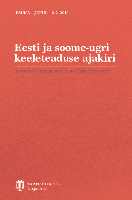
Eesti ja Soome-Ugri Keeleteaduse Ajakiri-Journal of Estonian and Finno-Ugric Linguistics
Bridging Academic Excellence in Language StudiesEesti ja Soome-Ugri Keeleteaduse Ajakiri - Journal of Estonian and Finno-Ugric Linguistics is a premier academic journal published by UNIV TARTU PRESS, dedicated to advancing the field of linguistics with a particular focus on the Estonian and Finno-Ugric languages. Since its inception, the journal has embraced an Open Access publishing model, allowing researchers and enthusiasts to freely explore its groundbreaking studies and findings since 2013. With an Impact Factor that places it in the Q3 quartile of leading journals within the linguistic domain, it serves as a vital platform for the dissemination of new research and theoretical advancements. Ranked 410th out of 1088 journals in the Arts and Humanities category for Language and Linguistics, it reflects a robust commitment to quality scholarship that appeals to academics, professionals, and students alike. Operating from Tartu, Estonia, the journal aims to foster greater understanding and appreciation of the Estonian language within the broader context of Finno-Ugric studies, making it an essential resource for anyone interested in these unique linguistic cultures.